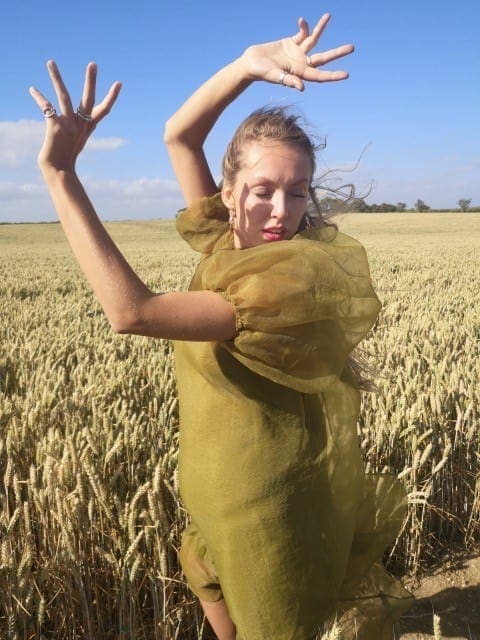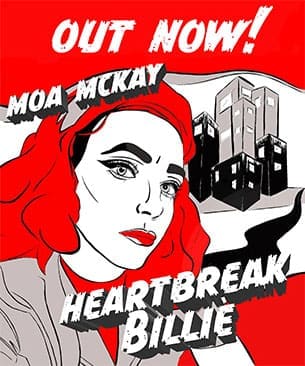Your EP that comes out on April 26th is called Knight in Neukölln….what’s behind the title? Does Neukölln inspire you particularly, and why?
After a residency at the London Roundhouse saw her opening for artists such as Jimmy Webb and Portico Quartet, UK artist Riah Knight relocated to Berlin to work on a groundbreaking theatre project exploring the politics of Roma identity in Europe, which led her to work with director Yael Ronen on a series of productions at The Maxim Gorki Theatre. In between rehearsals and tours in Europe, Riah recorded and released collaborations with several hip hop and jazz artists in Berlin and back in the UK, as well as writing for film, before finding time to work on her solo release ‘Knight in Neukölln’ with the Berlin based Get Together Collective. This first release of Riah’s personal work is a collection of original love songs and an intimate reflection of her time in the city.
Born in 1996 to activist parents and named after her Romani great-grandmother, Riah grew up in the rural countryside but spent much of her early life travelling and attending world music festivals. Sighting a broad range of influences, Riah’s music is characterized by her evocative lyrics and laidback sultry vocals, incorporating jazz harmony and a twist of folk, her soulful voice takes you on a journey across continents and young heartbreak. Often drawn to recurring motifs rooted in imagery of the natural world and full of strong female archetypes, Riah’s music can be both incredibly personal and playfully political.
We chat to Riah about her recent release and life as a musician in lockdown…
Tell us what’s behind the song Lament to Love?
Lament to Love is the first single from the EP, but was actually the last one to be written. It’s inspired by a poem I wrote in the early hours, after my boyfriend had left to catch a 4am flight back to London, leaving me in Berlin feeling hungry and alone. It stayed satisfied as a poem for a while, before aching to be finished during the first lockdown, when longing for loved ones took on a new significance. It’s about female desire and being unafraid to express it.
Why did you move to Berlin? And what are the main differences you find as an artist between living, working and performing in the UK and in Berlin?
I moved to Berlin to work on the theatre project Roma Armee with Yael Ronen; it was my first step into professional theatre and the first time I actively combined art and activism in my work. Since then I’ve been asked to do a show with her each year, which has been such an intense, transformative and fun learning experience. I’ve written songs about witches, goddesses, sexual consent and desire. And learnt a lot about politics and art in the process.
Along side this I have always been writing and recording my own music and collaborating a lot on music projects in berlin and back in the U.K.; this release was written during a specific period spent in Neukölln for a project called RomnjaJazz, an initiative that I co-founded with RomaTrial. The aim was to give exposure and support to Roma and Sinti women making Jazz inspired music in Berlin – for me this release is what came out of it.
I’ve written songs about witches, goddesses, sexual consent and desire
You say “When writing, I really hate to lose a line, they come to me so clearly” – can you tell us how you write; what pushes you to write; where inspiration comes from; and do you keep the lines that come into your head, or rework them, or…?
I’m always writing. Sometimes lyrical ideas resurfaces from experiences long after they’ve happened, or sometimes something hits me in the moment and I have to go and write it down somewhere- anywhere.
I love reading, poetry, plays etc and this love of words carries over to my compositions. In songs the lyrics are often the main focus for me.
Sometimes I write with a specific image in mind, but often I like to see what comes and then whittle it down afterwards. This is what I mean by hating to lose a line- often I have long audio recordings of epic 9 minute songs that then need to be cut up and refined. For me that’s the hardest bit!
The aim was to reclaim and rebrand our identity as Romani people, something which has been systematically stripped from us
You were born in rural England to “activist parents” and you have Romani roots – how do these different cultural identities work? And how do they play out in your art?
You came to Berlin to work on a theatre project that explores Roma identity in Europe – tell us about that?
In 2017 I was invited to be part of the cast for ‘Roma Armee’, a production at Gorki based on an idea from two Roma sisters- Simonida and Sandra Selimović. The aim was to reclaim and rebrand our identity as Romani people, something which has been systematically stripped from us, and form a supranational, diverse, feminist, queer ‘Army’ for the purpose of self-defence. “A rapid intervention force to fight structural discrimination, racism and antiziganism” and “emancipation from an internalized role of victims”.
The show was a hit, and sold out for its first year. We toured a lot and got nominated for some big prizes – it was a huge learning curve and an incredibly empowering experience (we will hopefully play again after covid). It also coincided with a rise of Roma and Sinti lead arts and culture initiations across Europe, and as it was the first Roma production on such a mainstream stage it set the ground for what could be achieved.
Knight in Neukölln is…a move away from a more direct political agenda in my art, focusing on expressing intimate moments in love.
How would you describe your music?
I always struggle to answer this question. How would you describe it?
You say that your music is quite political – in what way? And what is political?
Knight in Neukölln is not an overtly political release. It is an expression of my experience as a young woman in Berlin, political in the sense that the personal is the political, but it is actually a move away from a more direct political agenda in my art, focusing on expressing intimate moments in love.
I’m already working on some new music, where I’m writing using strong female archetypes; witches, mothers, resistance poets…. But for now I’m enjoying singing about love- ultimately what could be more important than love?
The first single, “Lament to Love”, had its first play on The Guilty Feminist
Where and when can we hear your new releases?
The first single of the EP, ‘Lament to Love’, came out on March 19th and had its first play on The Guilty Feminist, which was pretty cool! The next single is out April 19th and the whole EP will be released with Get Together Collective, a small Independent Berlin label, on April 26th.
How would you like to see the independent music industry come out of lockdown? What lessons have we learned, what lessons do you hope we have learned? How do you see the future of (independent) music?
Uff. I read Kae Tempest’s book ‘On Connection’ recently, and as is usually the case with her writing, it was exactly what I needed to hear.
During this period I’ve learnt how much we need real life connections, how important it is to feel loved and held and part of something bigger than ourselves. To feel and experience community. Music, theatre and live performance can give us this group connection and you just can’t substitute it with a screen. It’s like eating crisps when you’re hungry.
At the same time I’m also just hoping for some normality like everyone else, but then realising that maybe this is the new normal. As the ER protests were saying before this all started ‘business as usual’ is the problem.
Find Riah Knight on Facebook | Riah Knight on Instagram | Riah Knight on Bandcamp


